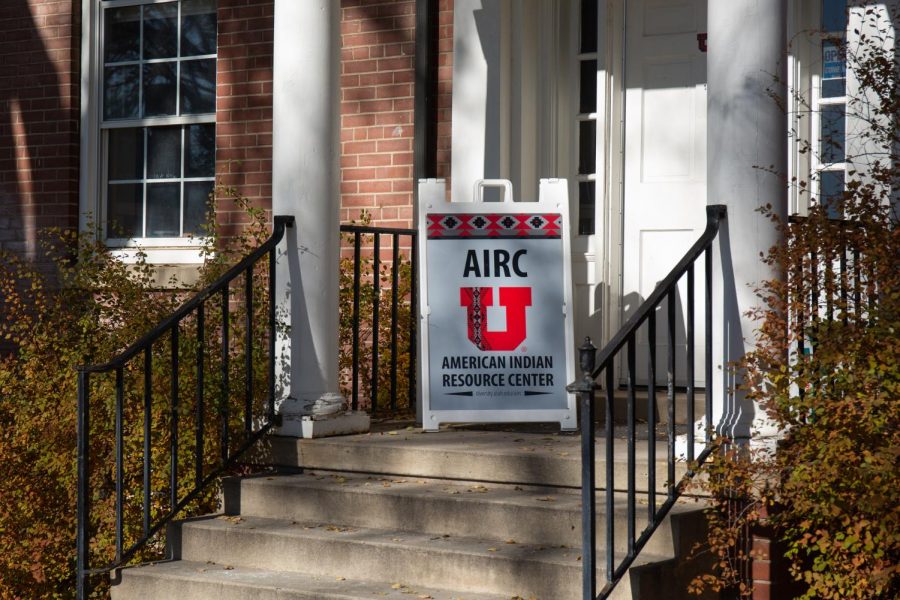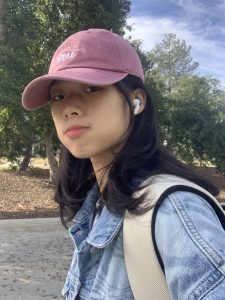As I write this, I sit at the American Indian Resource Center — the only space where many Native American students feel a sense of community on campus — located in Officers Circle. I stare across the field at the Fort Douglas Military Museum, which contains a memorial for Colonel Patrick Edward Connor, a man notorious for leading massacres of Native Americans in the mid-1800s. The irony doesn’t escape me.
On Jan. 29, 1863, Conner led one of the deadliest massacres in U.S. history, brutally murdering over 300 Shoshone men, children and women at their winter camp along the Bear River in Cache Valley, Idaho. My third great-grandmother, Wy-Ve-Dah, miraculously survived this massacre. Her bravery, resilience and pure survival instincts are one of the reasons I even exist today.
I am Eastern Shoshone, Western European and Scandinavian. My parents have always encouraged me to explore and celebrate all parts of my identity, so I’m lucky to have strong connections to my culture and relatives on the nearby Wind River Indian Reservation. The University of Utah occupies my own and other tribes’ traditional homelands. For many Indigenous peoples, connection to land is vital to our well-being, so it was easy for me to choose this as my home for the next eight years as I embark on the journey to becoming a physician scientist.
When I joined the U’s M.D.-Ph.D. program, I was fully aware that medicine and research are fields dominated by white men, but I’d be lying if I said it wasn’t exhausting being one of very few Natives in the entire School of Medicine. My outspoken passion for Native American health, research and advocacy has designated me as a “token Native.” I somehow became the go-to person for every question about Native Americans possible, as if I were a spokesperson for 500 unique tribes.
I’m tired of explaining to non-Natives that it’s inappropriate to ask a Native person about their blood quantum, how much money they receive from the government — which is usually none, by the way — or if they’ve ever smoked peyote. It’s disappointing watching my classmates skip our mandatory medical humanities course, where we discuss health disparities that Native Americans, refugees, LGBTQ+ and unsheltered people face — topics exploring my own lived experiences, but an inconvenient 50-minute mandatory discussion to them.
If I only focused on these challenges, I would burn out and never make it to graduation. Instead, I do what Indigenous peoples have done for centuries and lean into my community. Although we do not yet have nearly enough Native representation and leadership in the School of Medicine, we have brought dozens of allies into our circle who fight just as hard for our cause. I’ve formed meaningful relationships with the American Indian Resource Center, the Office of Health Equity, Diversity and Inclusion, and the Tribal, Rural and Urban Underserved Education program. Every time I receive administrative pushback, I gain twice the amount of support from my community.
In the 18 months I’ve been at the U, we’ve been successful in starting Utah’s first official chapter of the Association of Native American Medical Students. We’ve led outreach trips to the Wind River and Uinta and Ouray Indian Reservations, and the Navajo Nation. We’ve encouraged Native youth across the Mountain West to pursue higher education and show them that they too can be physicians and scientists. I’ve had the honor of providing cultural and academic mentorship to students in the Native American Research Internship, a program I once participated in.
We held a Traditional Indigenous Healing workshop in November and will soon offer the first Native American Health elective at the School of Medicine. Excellent Native American healthcare translates to excellent care for everyone. We strive to build a system driven by traditional Indigenous ideology by focusing on community and holistic care. Medicine needs more reciprocity, compassion, humility, respect, equity and trust.
Alone these are all small steps, but together have already contributed to creating an Indigenous presence at the School of Medicine. To my fellow student activists, I urge you to keep pushing. What we do matters. Our representation matters. Our voices matter. Most of the time it doesn’t feel that way … until I cry with one of my mentees as they open their acceptance letter to medical school or see a Native child playing with a stethoscope and overhear them telling their classmate “I think I will be a doctor too.”
I still often feel like I don’t belong, especially when I see the Colonel Conner memorial. I feel isolated until I meet new relatives, including a distant cousin whose ancestors also survived the Bear River Massacre and who is now on faculty here. It’s difficult walking in these two almost contradictory worlds as a rising physician and Indigenous person, so instead I integrate them. You do not have to choose one or the other. You never have to sacrifice your morals or values in whatever career you choose. You can be successful while still standing up for what you believe in. You will find people to lift you up.
— Jenna Murray, MPH, Association of Native American Med Students at the U
The Daily Utah Chronicle publishes guest op-eds written by faculty, elected officials and other members of the public on topics relevant to students at the University of Utah. The Chronicle welcomes guest op-ed pitches here.




John Hedberg • Feb 3, 2024 at 8:10 pm
Looks like I worded this backwards: The head of HRE was a darker skin tone than me. My bad~
John Hedberg • Feb 3, 2024 at 4:48 pm
Jenna,
I’m not First Peoples, but I feel for you. I’m BIPOC and intersectional, but I’m on the light side in my family (maybe you can relate), and I’ve also been ugly & poor most of my life, a combination I don’t recommend, even among people who share your identity, because you’ll get bullies and bigots even from your own “community”, and they tend to come for you in groups when you’re alone, being hateful cowards and insecure despite their supposed Equity convictions.
When I moved on campus, the discrimination and harassment started right away. I had hateful language launched my way several times at dining hall (Peterson) by students (including POC), where twice other students anonymously called campus police on me just for quietly eating my dinner (the cops refused to reveal the harassers). Two school employees harassed me for months while I tried to get them to see me as human by talking and joking around with them (to no avail). A Chartwells employee finally started charging me a different price than everyone else, and when I told HRE about it, without looking at any evidence besides how I look, Student Affairs pronounced me the “oppressor”, barred me from dining hall for the semester, and put a block on my next-semester registration if I didn’t comply with their punishment protocol, punishment for being the target of discrimination and naively trusting that Campus Equity would give a sh**. 😂😂 They actually came in on the side of the harassers!
Incidentally, I was also assaulted twice at Peterson, and when I reported both to the head of HRE Social Justice, who was a lighter skin tone than me, she actually said, “I think it’s good when this happens to someone like you; now you know how it feels”. FYI, I’ve been beaten up and harassed for being poor and funny looking since elementary school. My Mom’s an addict, and we (my sibs) did not grow up in a genteel neighborhood or in a genteel way, so my wardrobe has always been ‘Goodwill special’, and I got used to having only 1 haircut per year. I got cornered into fights all the time; people of all colors and identities looked down on me, maybe for being alone and independent and dressing like Oliver Twist. I made an inviting target for bullies, and Campus Equity evidently feels just fine with that~!
So, I feel for the other folks on campus of all flavors who’ve had bad language thrown at them, and who get scary encounters with campus police, bigoted professors, or campus Equity hypocrites when they’re being nothing but friendly. It comes from diverse students just as much as from the Equity priesthood working for the U, many who say they know better than to be bigots while they take out their virtue signaling or base insecurities on me, because they decide they don’t like the things they assume, or how they feel when they look at me (their worst feelings & prejudiced assumptions are always, always your responsibility somehow, never their own as equal grown adults, despite all their DEI propagandizing).
For me, there are no safe spaces on campus, the negative comments come from people who should know better but who sometimes figure it’s “their turn”, and so people who look poor or scary to Equity bigots end up leaving school, committing suicide, or worse. Consider this: maybe the Equity racists decide you’re an oppressor for being a lighter skin tone than the person you’re dating, so they decide not to defend you when you report threats of violence from the “oppressed” friend you had no trouble spending most of your free time with, and you end up being killed because nobody wanted to be there to defend the life someone who looked like you: it would look like institutional racism! (Shout out to Lauren McCluskey~).
We’re all fine, or we should be, by being and becoming exactly who we were created to be in this life. EQUALITY places everyone at equally high value. Equity is a hate-cult who owes us all an apology for the endless empty fear, division, and baseless ugly prejudice they rain on the rest of us daily with their relentless virtue-signaling and all the needless hypocrisy and suffering they cause by their preferred discrimination and hatreds, and for never giving their “permission” for everyone to simply Love each person for who we are: individual human beings with value & worth, all equal children in the eyes of God (By Whatever Name), equally fallible, equally forgivable, equally lovable and full of promise, with good purposes, good principles, good humor, and good heart. Accept everyone for the content of their character, for who we are as diverse & unique individuals, which is easy to do when your identity is Human and your cultural language is Love, no matter how others may identify you. Kindly, 😊
Douglas Hunsaker • Feb 3, 2024 at 12:26 pm
Jenna,
I was a sociology / psychology student back in the 1960s. Black, Chinese and Japanese cultures were brought up but no in-depth studies were offered. I would ask often, Why are there no in-depth offerings for those cultures and why are there no Native American studies available. Every faculty member gave the same answer, “I don’t know.” At the time, I was very interested in Medical Sociology and disappointed that nothing on the subjects above was in the texts or even mentioned in lectures.
Doug Hunsaker ’63